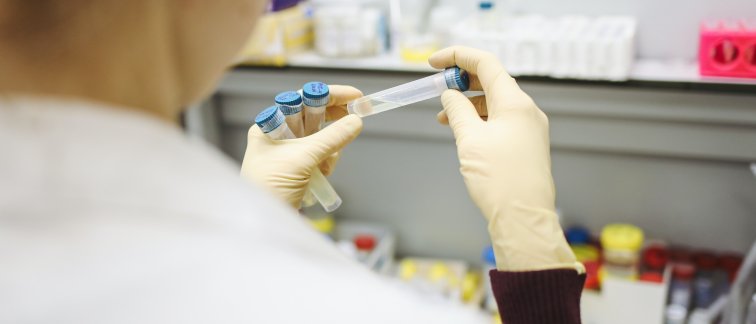Tens of thousands of patients in the Netherlands are dealing with the aftermath of COVID-19. Movement scientist Rob Wüst, immunologist Jeroen den Dunnen, and doctor-researcher Brent Appelman were interviewed bij de Volkskrant about this topic. They explain why they believe it has not yet been possible to find a cure for post-COVID syndrome. The foundation being set up by Ellen Bark-Lindhout may provide light at the end of the tunnel.
The patients that movement scientist Rob Wüst sees slogging away on the exercise bike do not even reach 100 Watt, which is the speed at which a healthy person cycles to the supermarket. Afterwards, they are exhausted and the following days the complaints they already had are intensified: enormous fatigue, difficulty concentrating, sometimes they even get a fever. It is one of the most common symptoms in patients with post-COVID syndrome, as international research recently showed: they become ill after the slightest physical effort.
Scientifically, it is a mysterious phenomenon, says Wüst, who specialises in muscle functions and exercise physiology at Amsterdam's Vrije Universiteit. After all, exercise is an excellent medicine in case of illness. Therefore, together with infectious disease specialist Michèle van Vugt, professor at the Amsterdam UMC, he set up a study among patients with post-COVID syndrome. This study concerns a cycling test in which before and after the cycling, blood is taken from the participants and a piece of muscle tissue is removed. The suspicion is that after the corona infection something went wrong in the mitochondria (the energy centres of the cells) of the post-COVID patients. ‘There has to be something in their bodies that makes them do so badly', says Wüst.
Tens of thousands of patients
According to a conservative estimate, several tens of thousands of patients in the Netherlands alone are dealing with the serious after-effects of Corona. But biomedical research into what goes on in their bodies hardly gets off the ground. In contrast to other countries, like the United States. An American team of experts drew up a research agenda eighteen months ago, and Congress made 1.4 billion euros available. A Dutch expert centre has not materialised, despite pressure from the patients' association: scientific knowledge is not combined, patients can only address their many questions to each other.
Of the fourteen scientific studies into long-term Corona complaints that received government funding last year through the ZonMW organisation, the majority were not bio-medical, but were merely aimed at identifying the problems. ‘The symptoms have gradually become familiar from foreign research', Wüst responds. The most important question is: how do patients get their symptoms? Last month, the coalition rejected a motion calling for more research into the cause and methods of treatment. ‘A lot is already happening in this field', was the reasoning of Health Minister Ernst Kuipers.
And so Wüst has set up the cycling study out of necessity with money from collected funds. Colleagues do all sorts of things in their spare time: a willing surgeon takes muscle biopsies from patients between operations or after his night shift. 'I buy a lot of chocolate boxes', says Wüst. This summer, the two Master's students who have taken many measurements for the research (for free) will graduate. Money to keep them is lacking, as is money to reserve expensive lab equipment. His colleague Jeroen den Dunnen now has to ‘go around with the hat’ to be able to continue his research.
Doctor-researcher Brent Appelman says there are already plenty of ideas among colleagues about possible treatments. But first there has to be clarity about the cause of the symptoms. In the past year and a half, he has seen more than a hundred patients with long-term complaints at the post-COVID polyclinic of the Amsterdam UMC, only some of whom have recovered. Brent Appelman: ‘The rest have been sitting at home for two years and are not making any progress. Why not?'
Domino effect
The researchers have found plenty of clues: minuscule blood clots that clog the vessels, problems in the muscles causing extreme fatigue, and an exaggerated reaction of the immune system. Researchers Appelman and Den Dunnen suspect that everything is connected, that a kind of domino effect takes place in patients' bodies. They are looking for a medicine that can break the chain.
'And not only for patients affected by Corona', says Den Dunnen. From Lyme disease to chronic Q fever and SARS: they are all caused by different pathogens, but patients have similar complaints. And there is no cure, because we don't know the cause yet. That's why it's worth investing in follow-up research now.
Patients are now so desperate that some are undergoing a kind of venesection in Germany at their own expense, an unproven treatment in which their blood is purified. As far as is known, one (existing) remedy is being tested in the Netherlands, again at the patient's own expense. The Rotterdam Franciscus Hospital is investigating whether patients with post-COVID syndrome can benefit from lactoferrin, a protein found in breast milk that has a beneficial effect on the immune system. The capsules and placebo pills are supplied free of charge by the manufacturer, says lung specialist Gert-Jan Braunstahl. Master's degree students in medicine administer the tests to the patients. The hospital pays the rest.
The researchers' hopes are focused on a foundation in formation that will collect money for biomedical research. The initiative comes from businesswoman Ellen Bark-Lindhout who saw how her friend, gynaecologist Annelies Bos, changed from a vital woman into a needy patient because of post-COVID syndrome. The foundation has a scientific council and soon, starting in the summer, a sounding board group of patients to assess the applications. Bark-Lindhout hopes that the foundation can get other potential financiers moving. So many people who are sick are sitting at home with misunderstood complaints, something has to happen. There must be some reason in their bodies why they are not doing well.
Source: read the original (Dutch) article by Ellen de Visser here.

